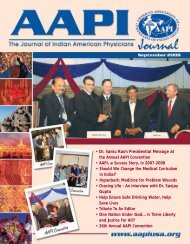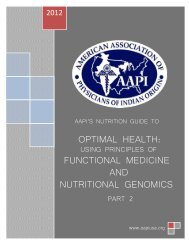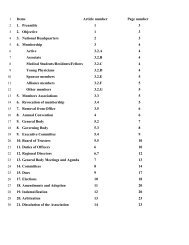functional medicine and nutritional genomics - American Association ...
functional medicine and nutritional genomics - American Association ...
functional medicine and nutritional genomics - American Association ...
Create successful ePaper yourself
Turn your PDF publications into a flip-book with our unique Google optimized e-Paper software.
AAPI’S NUTRITION GUIDE TO OPTIMAL HEALTH: USING PRINCIPLES OF FUNCTIONAL MEDICINE AND AND NUTRITIONAL GENOMICS<br />
models for obtaining <strong>and</strong> evaluating clinical<br />
information that leads to individualized, patientcentered<br />
therapies. Functional <strong>medicine</strong> concepts,<br />
practices, <strong>and</strong> tools have evolved considerably over<br />
a thirty-year period, reflecting the dramatic growth<br />
in the evidence base concerning the key common<br />
pathways to disease (e.g., inflammation, GI<br />
dysfunction, oxidative stress), the role of diet,<br />
stress, <strong>and</strong> physical activity, <strong>and</strong> the effects of<br />
environmental degradation (air, water, soil) on<br />
health.<br />
In addition, clinicians should keep in mind some<br />
basic concepts that have emerged from the prolific<br />
research literature. These concepts are altering our<br />
view of disease, patients, <strong>and</strong> all types of health<br />
care, including <strong>functional</strong> <strong>medicine</strong>:<br />
� Emergence: How genes are translated into<br />
patterns of health <strong>and</strong> disease<br />
� Exposome: How internal metabolic factors<br />
<strong>and</strong> environment influence gene expression<br />
� Epigenetics: The study of heritable<br />
changes in gene expression or cellular<br />
phenotype caused by mechanisms other<br />
than changes in the underlying DNA<br />
sequence<br />
� Nutritional <strong>genomics</strong> or nutri<strong>genomics</strong>: How<br />
different foods may interact with specific<br />
genes to increase the risk of common<br />
chronic diseases such as type 2 diabetes,<br />
obesity, heart disease, stroke <strong>and</strong> certain<br />
cancers<br />
� Pharmaco<strong>genomics</strong>: Prediction of drug<br />
response <strong>and</strong> clinical outcomes, reduction<br />
in adverse events, <strong>and</strong> selection <strong>and</strong><br />
dosing of drugs based on genotype<br />
� Proteomics: The study of the proteome,<br />
the complete set of proteins produced by<br />
a species, using the technologies of largescale<br />
protein separation <strong>and</strong> identification<br />
� Metabolomics or metabonomics: The study<br />
of metabolic responses to drugs,<br />
environmental changes <strong>and</strong> diseases—an<br />
extension of <strong>genomics</strong> (concerned with<br />
DNA) <strong>and</strong> proteomics (concerned with<br />
proteins)<br />
� Sociomics: How social networks influence<br />
health <strong>and</strong> disease<br />
8<br />
Elements of Functional Medicine<br />
The knowledge base—or ‚footprint‛—of <strong>functional</strong><br />
<strong>medicine</strong> is shaped by seven core principles:<br />
� Acknowledging the biochemical individuality<br />
of each human being, based on concepts<br />
of genetic <strong>and</strong> environmental uniqueness<br />
� Incorporating a patient-centered rather than<br />
a disease-centered approach to treatment<br />
� Seeking a dynamic balance among the<br />
internal <strong>and</strong> external factors in a patient’s<br />
body, mind, <strong>and</strong> spirit<br />
� Addressing the web-like interconnections of<br />
internal physiological factors<br />
� Identifying health as a positive vitality—not<br />
merely the absence of disease—<strong>and</strong><br />
emphasizing those factors that encourage a<br />
vigorous physiology<br />
� Promoting organ reserve as a means of<br />
enhancing the health span, not just the life<br />
span, of each patient<br />
� Functional <strong>medicine</strong> is a science-using<br />
profession<br />
These foundational principles of how the human<br />
organism functions—<strong>and</strong> how its systems<br />
communicate <strong>and</strong> interact—are essential to the<br />
process of linking ideas about multifactorial<br />
causation with the perceptible effects we call<br />
disease or dysfunction. To assist clinicians in<br />
underst<strong>and</strong>ing <strong>and</strong> applying this information,<br />
<strong>functional</strong> <strong>medicine</strong> has adapted <strong>and</strong> organized a<br />
set of seven biological systems in which core<br />
clinical imbalances are found; these function as<br />
the intellectual bridge between the rich basic<br />
science literature concerning physiological<br />
mechanisms of disease (first two years of medical<br />
training) <strong>and</strong> the clinical studies, clinical<br />
experience, <strong>and</strong> clinical diagnoses of the second<br />
two years of medical training. The core clinical<br />
imbalances serve to marry the mechanisms of<br />
disease with the manifestations <strong>and</strong> diagnoses of<br />
disease. Many common underlying pathways of<br />
disease are reflected in a few basic clinical<br />
imbalances:<br />
� Assimilation: digestion, absorption,<br />
microbiota/GI, respiration<br />
2012

















